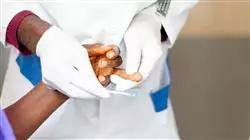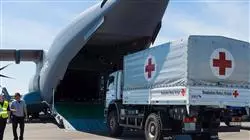University certificate
The world's largest faculty of medicine”
Introduction to the Program
Bringing healthcare to the most deprived countries is essential for the survival of their inhabitants. If you want to develop in this field and treat people without resources, in this Professional master’s degree we offer you all the keys to specialize in international cooperation"

Developed countries must invest in international cooperation to improve the living conditions of people who do not have sufficient resources with which to support themselves. International Cooperation helps to improve the living conditions of the most disadvantaged people in different areas: social, economic and health, taking into account a sustainable and egalitarian point of view. One of the fundamental needs of any society is healthcare, which is why this area must be provided with the most resources in order to improve citizens’ health and quality of life. .
For this reason, TECH offers this Professional master’s degree for doctors who wish to specialize in the humanitarian field and International Cooperation, with the aim of allowing them to work in regions with great needs. That’s why this program is created by professionals in the world of education and International Development Cooperation. Each module is written from the experience and reality encountered in different regions of the world. By studying this program, the student will acquire the skills required to work and apply the knowledge acquired in all types of roles within national and international, public and private organizations.
In addition, as it is a 100% online program, the physician will be able to combine the study of this very complete program with the rest of their daily obligations, choosing at all times where and when to study. A high-level qualification that will take the medical professional to the highest level in their field of practice.
International Cooperation helps to improve the living conditions of people living in developing countries, which is why it is a fundamental task in both social and health matters"
This Professional master’s degree in International Development Cooperation contains the most complete and up-to-date scientific program on the market. The most important features of the program include:
- Practical cases presented by experts in International Development Cooperation
- The graphic, schematic, and practical contents with which they are created provide scientific and practical information on the disciplines that are essential for professional practice
- Latest developments in International Development Cooperation
- Practical exercises where the self-assessment process can be carried out to improve learning
- Emphasis on innovative methodologies in International Development Cooperation
- Theoretical lessons, questions to the expert, debate forums on controversial topics, and individual reflection assignments
- Content that is accessible from any fixed or portable device with an Internet connection
This Professional master’s degree is the best investment you can make when selecting a refresher program, for two reasons: in addition to updating your knowledge in International Development Cooperation, you will obtain a qualification from TECH Global University"
The program’s teaching staff includes professionals from the sector who contribute their work experience to this program, as well as renowned specialists from leading societies and prestigious universities.
The multimedia content, developed with the latest educational technology, will provide the professional with situated and contextual learning, i.e., a simulated environment that will provide an immersive program to learn in real situations.
This program is designed around Problem-Based Learning, whereby the professional must try to solve the different professional practice situations that arise throughout the program. This will be done with the help of an innovative system of interactive videos made by renowned experts.
Increase your decision-making confidence by updating your knowledge through this Professional master’s degree"

Take the opportunity to learn about the latest advances in this field and apply it to your daily practice"
Why study at TECH?
TECH is the world’s largest online university. With an impressive catalog of more than 14,000 university programs available in 11 languages, it is positioned as a leader in employability, with a 99% job placement rate. In addition, it relies on an enormous faculty of more than 6,000 professors of the highest international renown.

Study at the world's largest online university and guarantee your professional success. The future starts at TECH”
The world’s best online university according to FORBES
The prestigious Forbes magazine, specialized in business and finance, has highlighted TECH as “the world's best online university” This is what they have recently stated in an article in their digital edition in which they echo the success story of this institution, “thanks to the academic offer it provides, the selection of its teaching staff, and an innovative learning method aimed at educating the professionals of the future”
A revolutionary study method, a cutting-edge faculty and a practical focus: the key to TECH's success.
The most complete study plans on the university scene
TECH offers the most complete study plans on the university scene, with syllabuses that cover fundamental concepts and, at the same time, the main scientific advances in their specific scientific areas. In addition, these programs are continuously being updated to guarantee students the academic vanguard and the most in-demand professional skills. In this way, the university's qualifications provide its graduates with a significant advantage to propel their careers to success.
TECH offers the most comprehensive and intensive study plans on the current university scene.
A world-class teaching staff
TECH's teaching staff is made up of more than 6,000 professors with the highest international recognition. Professors, researchers and top executives of multinational companies, including Isaiah Covington, performance coach of the Boston Celtics; Magda Romanska, principal investigator at Harvard MetaLAB; Ignacio Wistumba, chairman of the department of translational molecular pathology at MD Anderson Cancer Center; and D.W. Pine, creative director of TIME magazine, among others.
Internationally renowned experts, specialized in different branches of Health, Technology, Communication and Business, form part of the TECH faculty.
A unique learning method
TECH is the first university to use Relearning in all its programs. It is the best online learning methodology, accredited with international teaching quality certifications, provided by prestigious educational agencies. In addition, this disruptive educational model is complemented with the “Case Method”, thereby setting up a unique online teaching strategy. Innovative teaching resources are also implemented, including detailed videos, infographics and interactive summaries.
TECH combines Relearning and the Case Method in all its university programs to guarantee excellent theoretical and practical learning, studying whenever and wherever you want.
The world's largest online university
TECH is the world’s largest online university. We are the largest educational institution, with the best and widest online educational catalog, one hundred percent online and covering the vast majority of areas of knowledge. We offer a large selection of our own degrees and accredited online undergraduate and postgraduate degrees. In total, more than 14,000 university degrees, in eleven different languages, make us the largest educational largest in the world.
TECH has the world's most extensive catalog of academic and official programs, available in more than 11 languages.
Google Premier Partner
The American technology giant has awarded TECH the Google Google Premier Partner badge. This award, which is only available to 3% of the world's companies, highlights the efficient, flexible and tailored experience that this university provides to students. The recognition as a Google Premier Partner not only accredits the maximum rigor, performance and investment in TECH's digital infrastructures, but also places this university as one of the world's leading technology companies.
Google has positioned TECH in the top 3% of the world's most important technology companies by awarding it its Google Premier Partner badge.
The official online university of the NBA
TECH is the official online university of the NBA. Thanks to our agreement with the biggest league in basketball, we offer our students exclusive university programs, as well as a wide variety of educational resources focused on the business of the league and other areas of the sports industry. Each program is made up of a uniquely designed syllabus and features exceptional guest hosts: professionals with a distinguished sports background who will offer their expertise on the most relevant topics.
TECH has been selected by the NBA, the world's top basketball league, as its official online university.
The top-rated university by its students
Students have positioned TECH as the world's top-rated university on the main review websites, with a highest rating of 4.9 out of 5, obtained from more than 1,000 reviews. These results consolidate TECH as the benchmark university institution at an international level, reflecting the excellence and positive impact of its educational model.” reflecting the excellence and positive impact of its educational model.”
TECH is the world’s top-rated university by its students.
Leaders in employability
TECH has managed to become the leading university in employability. 99% of its students obtain jobs in the academic field they have studied, within one year of completing any of the university's programs. A similar number achieve immediate career enhancement. All this thanks to a study methodology that bases its effectiveness on the acquisition of practical skills, which are absolutely necessary for professional development.
99% of TECH graduates find a job within a year of completing their studies.
Professional Master's Degree in International Cooperation for Development
Humanitarian activities in the medical field framed in this type of projects are of vital importance to contribute to the fulfillment of the objectives proposed by the General Assembly, especially those related to health and welfare and the reduction of inequalities. With this in mind, at TECH Global University we have created this Professional Master's Degree focused on the technical application of development theories and their impact on the economic, social, cultural and political spheres. Thanks to our comprehensive curriculum, students will be able to understand the fundamentals of the structures that govern the global functioning of nations in order to deepen their understanding of the available access routes that favor the exchange of resources and services. It also offers a series of contents covering the challenges of this work, the role of NGOs in the construction of local, regional and international solidarity networks and the factors that highlight the relevance of the promotion of human rights, with special emphasis on education, equality and environmental quality. At the practical-administrative level, thematic axes are presented that address the project management cycle, focusing on analytical techniques for policy implementation, such as, for example, the logical framework.
Professional Master's Degree in International Development Cooperation
Studying this TECH Postgraduate Certificate gives professionals the opportunity to fully immerse themselves in the global initiatives of the fight against poverty, through the acquisition of skills for the implementation of humanitarian actions. By mastering knowledge of regional realities, the coordination of global objectives and the system of international relations (actors, interests, pacts), they will be able to promote innovative action frameworks that contribute to the proper management of the risks to which populations are exposed. All of this, based, of course, on an acute analysis of their basic needs and sectoral-geographical priorities. In this way, the Professional Master's Degree graduate will be able, in the first instance, to comprehensively understand the different contexts (micro/macro), which will allow him/her to promote their respective development processes, to assess obstacles and to respond to crisis and emergency situations.







